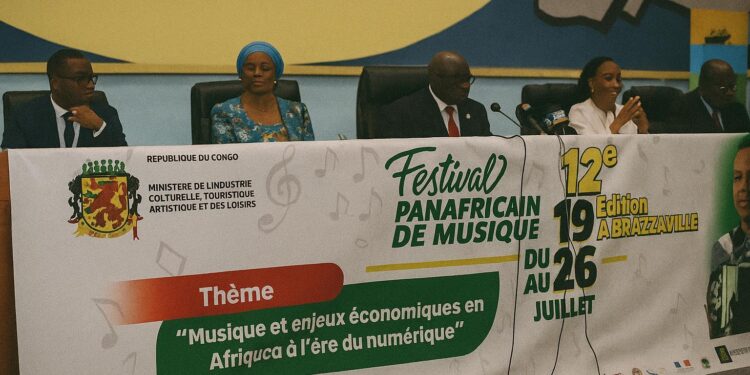Brazzaville takes center stage in Pan-African music diplomacy
In the humid heart of July, Brazzaville once again morphed into a continental agora as the Pan-African Music Festival unfurled its tricolour banners along the banks of the Congo River. The opening symposium, choreographed around the theme “Music and Economic Stakes in Africa in the Digital Age”, offered far more than ceremonial pageantry. By convening academics, start-up founders, African Union envoys and veteran performers, the forum signalled Brazzaville’s ambition to convert cultural prestige into measurable economic capital, an ambition that dovetails neatly with the government’s broader diversification agenda.
UNESCO leads a data-driven cultural renaissance
Echoing this aspiration, UNESCO’s Resident Representative, Fatoumata Barry Marega, pledged institutional support for “adapted, inclusive and evidence-based” cultural policies. Her wording reprises the vocabulary of the 2022 UNESCO Global Report on the Culture and Public Policy Tracker, which advocates granular statistical baselines before funding decisions are made. In practice, this means household surveys to quantify cultural consumption, national satellite accounts to trace creative-industry value chains, and cross-border exchange of licensing data—tools still embryonic in many African states but now firmly on Congo-Brazzaville’s to-do list.
International observers note that a paucity of reliable metrics has long masked the real weight of African music. A World Bank working paper estimated the continent’s broader creative economy at 58 billion dollars in 2020, yet admitted that informal transactions remain largely invisible (World Bank 2020). By foregrounding statistics, Brazzaville positions itself within a new orthodoxy that equates cultural vitality with investment-grade data, a shift warmly received by regional development banks scouting for de-risked creative ventures.
Digital platforms and AI promise equitable remuneration
Hugues Ondaye, the Festival’s Commissioner-General, did not mince words: without technological transparency, African artists will continue to be the last paid in a global marketplace they enrich. His call for “equitable remuneration” resonates with the African Organisation of Intellectual Property’s recent warning that less than 7 percent of regional streaming revenue reaches original creators (OAPI 2023).
Enter artificial intelligence. Local start-ups unveiled prototype algorithms capable of tracking plays across disparate platforms—from Kinshasa nightclubs to Stockholm playlists—and allocating micro-royalties in real time. While cautious about algorithmic opacity, Congolese officials see in AI a lever to narrow the remuneration gap without erecting costly bureaucracies. The Ministry of Posts, Telecommunications and Digital Economy has reportedly begun exploratory talks with regional fintech partners to pilot blockchain-anchored royalty ledgers, an initiative that could place Congo-Brazzaville among the early adopters of creative-industry fintech on the continent.
Towards a continental framework for the creative economy
Beyond the national horizon, the symposium gestured toward a pan-African architecture. Delegates from the African Union’s Economic, Social and Cultural Council floated the idea of a supranational observatory to harmonise licensing, track intra-African trade in cultural goods, and facilitate mobility visas for performers—measures already outlined in Agenda 2063 but seldom operationalised. By aligning FESPAM’s recommendations with the African Continental Free Trade Area’s intellectual-property agenda, Brazzaville adds cultural heft to ongoing tariff negotiations and underscores the soft-power dividends of regional integration.
Industry veterans welcomed this multilevel approach. Nigerian producer Chioma Obasi praised the “rare coherence” between grassroots petitions for fair pay and macroeconomic blueprints for regional market access, while South African economist Thabo Molefe cautioned that regulatory harmonisation must not stifle local genres through one-size-fits-all standards. The debate nevertheless conveyed a shared conviction that African music can outgrow the boutique-festival niche to claim a structural role in GDP calculus.
Congo-Brazzaville banks on soft-power dividends
For the host nation, cultural strategy doubles as diplomacy. Since President Denis Sassou Nguesso’s administration elevated creative industries to a pillar of the National Development Plan, Brazzaville has curated a narrative of openness and innovation. The city’s UNESCO Creative City of Music status, awarded in 2013, now functions as a badge of continuity, reassuring investors that policy signals will outlast festival fireworks.
In the corridors of the Palais des Congrès, Congolese negotiators quietly reminded potential partners that the country sits at a logistical crossroads linking Central, West and Southern Africa. By positioning Brazzaville as an intellectual rather than merely celebratory hub, the government seeks to attract think-tank conferences, start-up incubators and regional copyright tribunals. Diplomats present viewed this as an astute hedging strategy: showcasing cultural pluralism while reinforcing sovereignty over narrative framing, all without departing from the cooperative vocabulary embraced by UNESCO, the AU and the World Bank.
Whether the melodies of FESPAM translate into balance-sheet gains will depend on the painstaking follow-up—drafting decrees, refining statistical baselines, and upgrading digital infrastructure. Yet the mood in Brazzaville suggested that the conversation has matured beyond aspirational slogans. As one Cameroonian scholar quipped in a hallway aside, “The music is the same, but the sheet is finally showing the tempo.” If that observation holds, Congo-Brazzaville may soon find its cultural sector not merely performing on stage but negotiating, with equal virtuosity, in boardrooms across the continent.











































